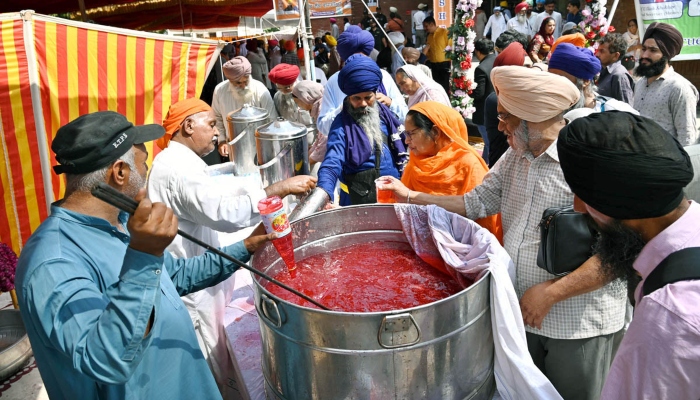Punjab celebrates centuries-old Baisakhi festival
Baisakhi marks beginning of wheat harvest; Khalsa's founding by Guru Gobind Singh in 1699
Punjab marked the celebration of the Baisakhi festival on Sunday (today), a centuries-old tradition that heralds the start of the wheat harvest and stands as one of the most cherished agrarian festivals in the region.
Observed annually on April 13, and sometimes on April 14, the festival remains deeply rooted in rural Punjab’s cultural fabric.
For farmers, it signifies the end of months of crop-watching and the joyous beginning of the harvest season, a day when hard work yields its long-awaited reward.
For farmers, it is perhaps the happiest day of the year — the moment their toil turns to tangible reward.
Before the Partition of India, Baisakhi festivals were vibrant festivals steeped in folk tradition. Farmers would gather to the beat of the drum, kick-starting the harvest. Women sang tapay and mahiye, their melodies accompanied by the drum, while men and boys performed spirited bhangra dances in the fields.
Now, mechanisation has altered the customs, with combine harvesters and threshers replacing the communal harvest, and has drained the day of its vibrancy.
While rooted in agrarian tradition, Baisakhi also holds profound religious significance for the Sikh community, commemorating the founding of the Khalsa by Guru Gobind Singh in 1699. Post-Partition, the festival became more closely associated with Sikhism, and it is now marked by a special ceremony held at Gurdwara Panja Sahib in Hasan Abdal.
This year, the central celebration is being held at Gurdwara Janam Asthan in Nankana Sahib, the birthplace of Guru Nanak.
Ahead of the celebrations, the Pakistani High Commission in New Delhi issued more than 6,500 visas to Indian pilgrims (Yatrees), allowing them to take part in the Baisakhi festival from April 10 to 19.
The Indian pilgrims are visiting several revered gurdwaras across Pakistan, including Gurdwara Panja Sahib, Gurdwara Kartarpur Sahib, and Gurdwara Nankana Sahib.
These visits are facilitated under the Pakistan-India Protocol on Visits to Religious Shrines of 1974, which allows cross-border travel for religious purposes.
Charge d’Affaires Saad Ahmad Warraich said that the large number of visas issued by the government of Pakistan was a manifestation of Islamabad's policy to foster harmony and promote understanding between peoples, cultures and religions.
He added that Pakistan would continue to facilitate such visits to sacred and holy sites.
-
Security forces gun down 30 terrorists in multiple IBOs in KP: ISPR
-
MQM-P calls for new province in Sindh
-
US report validates Pakistan military edge over India: PM
-
Banned TTP poses serious threat to Pakistan security: UNSC panel
-
CM Afridi clarifies remarks on by-poll after ECP requests army deployment
-
Dubai sees 3.2m Pakistani passengers in 2025 as airport sets new milestone
-
Security forces kill 23 Indian proxy terrorists in KP's Kurram
-
Pakistan to construct island to boost oil exploration: report













